

Vigilance (psychology) 7 Practical Strategies to Overcome Emotional Pain. Life is filled with emotional bumps, bruises, illnesses, and strains.
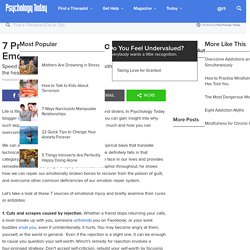
In Psychology Today blogger Guy Winch’s new book, Emotional First Aid, you can gain insight into why such experiences as rejection, loss, and failure hurt so much and how you can overcome the psychological injuries these can create. We can all benefit from self-help books with a solid empirical basis that translate technical jargon into practical advice, and Winch’s book definitely falls in that category. He analyzes the 7 most difficult situations we face in our lives and provides remedies for each. Cognitive dissonance. Psychological stress resulting from multiple contradictory beliefs, ideas, or values held at the same time Coping with the nuances of contradictory ideas or experiences is mentally stressful.
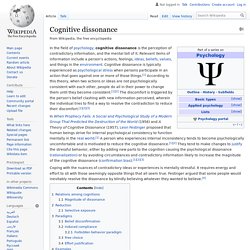
It requires energy and effort to sit with those seemingly opposite things that all seem true. Festinger argued that some people would inevitably resolve dissonance by blindly believing whatever they wanted to believe. Relations among cognitions[edit] To function in the reality of society, human beings continually adjust the correspondence of their mental attitudes and personal actions; such continual adjustments, between cognition and action, result in one of three relationships with reality:[2] Magnitude of dissonance[edit] The term "magnitude of dissonance" refers to the level of discomfort caused to the person. The Dunning-Kruger effect, and how to fight it, explained by psychologist David Dunning. David Dunning, a psychology professor at the University of Michigan, has devoted much of his career to studying the flaws in human thinking.
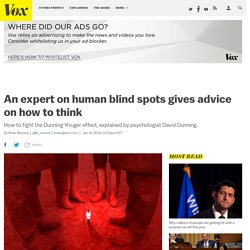
I’ve Been Committed To A Psych Ward Three Times — And It Never Helped. With Level One privileges at the psychiatric hospital where I was involuntarily committed in 2002, the patient was allowed off the ward for breakfast.
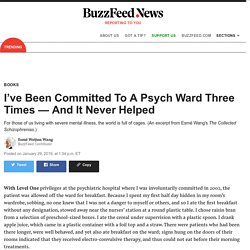
Because I spent my first half day hidden in my room’s wardrobe, sobbing, no one knew that I was not a danger to myself or others, and so I ate the first breakfast without any designation, stowed away near the nurses’ station at a round plastic table. I chose raisin bran from a selection of preschool-sized boxes. I ate the cereal under supervision with a plastic spoon. I drank apple juice, which came in a plastic container with a foil top and a straw. The Two Faces of Suicide. - The Washington Post. Fixed vs. Growth: The Two Basic Mindsets That Shape Our Lives - Brain Pickings - Pocket.
Future - Is there a link between mass shootings and mental illness? In Stephen King’s The Shining, the character Jack Torrance epitomises the popular horror trope of crazed killer who can no longer distinguish reality from hallucination.
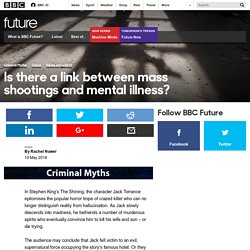
As Jack slowly descends into madness, he befriends a number of murderous spirits who eventually convince him to kill his wife and son – or die trying. The audience may conclude that Jack fell victim to an evil, supernatural force occupying the story’s famous hotel. Why are we surprised that therapy has its downsides? ‘Get help and get happy!”

Runs a tagline for one of the new generation of e-counselling services, offering psychotherapy by text, phone and video chat. Except it turns out that getting happy is by no means guaranteed to be therapy’s only outcome. One recent paper (which I found via the excellent Research Digest blog) estimates that, when it comes to cognitive behavioural therapy, 43% of clients will experience unwanted side-effects like distress, a deterioration in their symptoms, or strained family relations. Suicide Survivors and How They Coped - Suicide Prevention and Help.
The Peculiar Story of the Schizophrenic and the Shaman. Why Do People Kill Themselves? New Warning Signs. The beeper next to my bed went off at 1:30 a.m.
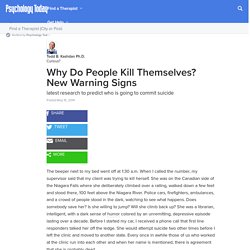
When I called the number, my supervisor said that my client was trying to kill herself. She was on the Canadian side of the Niagara Falls where she deliberately climbed over a railing, walked down a few feet and stood there, 100 feet above the Niagara River. How knowledge about different cultures is shaking the foundations of psychology.
The academic discipline of psychology was developed largely in North America and Europe.
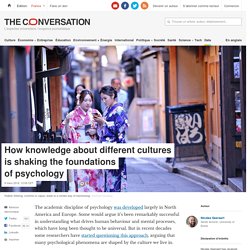
Some would argue it’s been remarkably successful in understanding what drives human behaviour and mental processes, which have long been thought to be universal. But in recent decades some researchers have started questioning this approach, arguing that many psychological phenomena are shaped by the culture we live in. Clearly, humans are in many ways very similar – we share the same physiology and have the same basic needs, such as nourishment, safety and sexuality. The Psychology of Cheating. A few years ago, acting on a tip, school administrators at Great Neck North High School, a prominent, academically competitive public school in Long Island, took a closer look at students’ standardized test scores. Some of them seemed suspiciously high.
What’s more, some of the high scorers had registered to take the test well outside their home district. When the Educational Testing Service conducted a handwriting analysis on the suspect exams, they concluded that the same person had taken multiple tests, registering each time under a different name. The bright side of sadness. What Enrico Gnaulati's new book about psychology and diagnosis gets wrong. When clinicians write books leavened with patient vignettes, they often highlight the drama of making diagnoses.
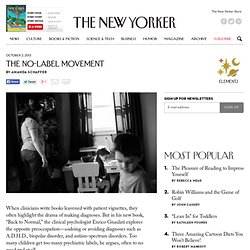
But in his new book, “Back to Normal,” the clinical psychologist Enrico Gnaulati explores the opposite preoccupation—undoing or avoiding diagnoses such as A.D.H.D., biopolar disorder, and autism-spectrum disorders. Too many children get too many psychiatric labels, he argues, often to no good end at all. At one point in the book, Gnaulati introduces readers to Joseph, a hot-tempered thirteen-year-old who often raged against his mother, one night hurling expletives and bashing the wall, only to ask, a half hour later, for a grilled-cheese sandwich.
Although a child psychiatrist determined that the boy was bipolar and prescribed medication, Gnaulati saw him and insisted otherwise. Psychotherapy’s Image Problem. This is not necessarily for a lack of interest.

A recent analysis of 33 studies found that patients expressed a three-times-greater preference for psychotherapy over medications. As well they should: for patients with the most common conditions, like depression and anxiety, empirically supported psychotherapies — that is, those shown to be safe and effective in randomized controlled trials — are indeed the best treatments of first choice. Medications, because of their potential side effects, should in most cases be considered only if therapy either doesn’t work well or if the patient isn’t willing to try counseling.
So what explains the gap between what people might prefer and benefit from, and what they get? The answer is that psychotherapy has an image problem. For the sake of patients and the health care system itself, psychotherapy needs to overhaul its image, more aggressively embracing, formalizing and promoting its empirically supported methods. When Work Becomes A Haven From Stress At Home. Abstract Speaking's Power: When Communication's Not in the Details.
Charles Darwin's Evolution: Did His Anxieties Shape His Science? NEW YORK — How much did Charles Darwin's personal anxieties influence his work on the theory of evolution? Did the tragedy of losing his mother at an early age shape the type of scientist he would become? Dr. Gail Saltz, an associate professor of psychiatry at the New York Presbyterian Hospital Weill-Cornell School of Medicine, and David Kohn, founder and director of the Darwin Manuscripts Project at the American Museum of Natural History, discussed these and other intimately personal questions about Darwin on Monday (March 3) here at the 92nd Street Y in Manhattan. How to Help Kids Cope with Irrational Fears. Self Tests by Psychology Today.